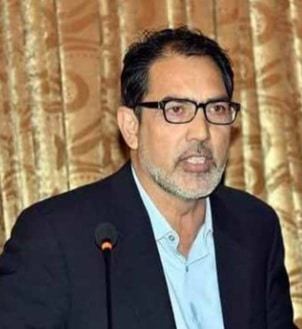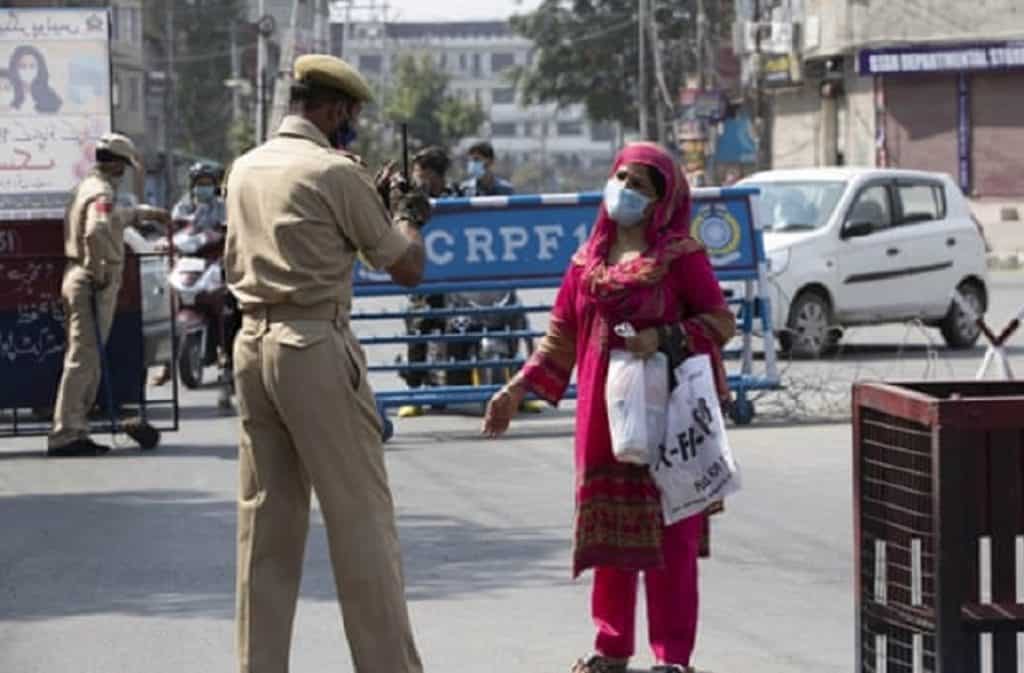We spoke to Dr. Altaf Hussain Wani about the current situation in Kashmir, the risk of a nuclear flashpoint in the region, the desirable role of United Nations, and Joe Biden Presidency, in mediating in the dispute, and what should be a fair solution to the conflict.

Altaf Hussain Wani is the Chairman of the Kashmir Institute of International Relations (KIIR).
World Geostrategic Insights (WGI) – In August 2019 the Modi government revoked the Article 370 of the Indian Constitution, which gave a special status to the Kashmir, converting it into two Union Territories, no different from any other Indian state, and thus enabling a direct rule and control from New Delhi. How has life changed in Kashmir after such a decision?
Altaf Hussain Wani (AW) – The revocation of political autonomy of Indian occupied Kashmir through a presidential order in unconstitutional and in contravention to the international law and United Nations security council resolutions on Jammu and Kashmir. Although this political autonomy was already eroded to a greater extent since article 370 was introduced to the Indian constitution. But still it has some emotional belonging to the people of Kashmir.
The motives behind this revocation were very clear and sinister in nature. The main motive is to change the demography of Indian occupied Kashmir. That is why Indian government not only revoked the article 37o and 35/A of Indian constitution but also dismembered the state into two union territories.
Infact all the efforts of BJP led right wing government was to deny them its special status which had historical and legal basis. Kashmir is an international dispute with its basis anchored in multiple United Nations Security Council Resolutions. First this accession was purely illegal as India itself took it to the United Nations after the illegal accession resultantly it loses its legitimacy. Secondly the architect of this special status never envisaged merger of Kashmir like other states keeping its unique identity in backdrop. The fundamentals agreed with the state of India was the protection of identity, land rights and internal autonomy including State Subjects Rule (SSR) which were irreversible. Despite all commitments Indian state kept on disempowering state, and already had hollowed the state autonomy and powers even before August 5th. Despite utmost efforts to control people the failure of Indian state against legitimate resistance of people was obvious. Special illegal laws operating with impunity, extra- judicial killings, human rights abuses was the response of Indian state against legitimate freedom struggle of people. Mind it people of Kashmir never legitimized illegal annexation and Indian rule. The resistance came up from people because of further alienation of Kashmiris through abboragaiton of Article 300 aimed at depriving people from their lands which is source of their livelihood and sustenance.
In this backdrop, people of Kashmir were the recipients of worst state oppression, caging, maiming, and infact life has been chocked through state machinery. On political fronts, just to counter resistance, all the leadership across the board was caged, deprived of all sort of freedom and slapped with fake and fictitious charges. Political space is virtually ziltch, and any dissent was treated as treason.
On economic fronts, the worst ever locked down, clamped down and restrictions crippled the business activities and brought Kashmiris to its knees. Big business houses were bankrupt, losses were in billions and government of India deliberately delayed and denied the access of traders to market to send goods resulted in massive economic set back to people .
On social front, life has become nightmare, media, activists, lawyer’s civil society were people were subjected to threats, booked under sedition, and denied all the fundamental rights including speech, expression and movement.
A comprehensive strategy to marginalized people on all three fronts including economic, political, and social has suffocated life, made Kashmiris mark of state of suppression and legitimate nonviolent resistance was met with iron hands.
WGI – You recently made a passionate appeal to UN Secretary General António Guterres urging him to pressure the Indian government to stop human rights violations in the territory of Kashmir. What more should the UN do? Do you think there is still a chance for India and Pakistan to resolve peacefully their Kashmir dispute, in accordance with the UN Charter, Security Council resolutions and bilateral agreements?
AW – Role of UN is important given the nature of dispute between two countries. India claiming to be the responsible member of UN should be reflected in practice. A country aspiring for the full membership of UNSC has to address the outstanding issues and particularly issue of Jammu and Kashmir as agreed in the past. Over dozens resolutions has been passed in UNSC over Kashmir dispute, and there has been two reports recently published b office the UNHRC on the dismal situation of HR in Kashmir, this becomes more important to not only follow up but to work on its implementation. The long standing issue on the agenda of UN is also a big question mark on UN, role, capacity and legitimacy to address it with the will and aspirations. Besides two nuclear arms countries and their intense involvement in a dispute should be the real worry for UN as in near past they narrowly escaped full-fledged war which could have been a nightmare for the peace of the entire globe. SO UNS roll is pivotal, Kashmiris always banked upon the UNSC resolutions, and consider it the reference point for the just resolution of this dispute. In current scenario it has become more important for United Nations to intervene because of the one of the p5 member’s active involvement in the dispute after august 5, 2019.
WGI – The dispute over the status of Jammu and Kashmir involves three parties: Pakistan, India and the people of Jammu and Kashmir. Is still workable the idea that the dispute should be resolved by the will of the people, through a free and impartial plebiscite?
AW – Absolutely. It is a complex dispute, and delayed attention has further complicated situation. People of Kashmir are the primary party to this unending dispute and UNSC also confer reasonability to both India and Pakistan to resolve this issue. Everything has been tried, and tested, including bilateral dialogue, wars, and diplomatic offence by both countries but the not the intervention of UN after 1957,
It is important mention that the struggle of people of Kashmir is deeply anchored on the value of Human rights, dignity and self-determination. Any process without the actual stakeholders will be futile and further complicate the situation.
WGI – Donald Trump, during his presidency, has reiterated offers to help mediate between India and Pakistan over Kashmir, offers that India has rejected. Now, you warmly welcomed US president-elect Joe Biden for winning the elections and you expressed the hope that the new US administration will play a significant role in resolving the dispute. But what could Biden do more than Trump?
AW – Role of US is pivotal not only in Kashmir but across the globe. A leading superpower with the influence on both India Pakistan can help create a situation conducive for the just resolution of this dispute. So Kashmiris always welcomed the role played by US keeping the very foundation of US in backdrop which believes in human rights, equality, justice and tolerance. Though Donald Trump offer was welcomed across the Kashmir but sadly due to Indian belligerent attitude it was not materialized. With new Biden administration I strongly believe that given the value system and commitment to rights and freedom he has, there is lot of hope that they can push stakeholders to resume dialogue, undo the actions Indian Government took, and ask India to respect fundamental right of people of Kashmir. The values of tolerance, dignity, freedom, care and cooperation expressed during hi campaign gave a new hope to people of Kashmir and they can relate it to the core. Any leadership who believes in universal values of freedom will definitely stand by Kashmiris and their just demands.
WGI – While Pakistan has warned that if the world does nothing to stop India over Kashmir, the two nuclear countries will move closer to a military confrontation, this issue is not receiving the attention of governments of powerful nations. So could Kashmir really become a nuclear flashpoint?
AW – To some it is already a nuclear flash point, and others believe that there is no possibility of nuclear confrontation between India and Pakistan. I am not a security expert but to me unattended Kashmir dispute has proved more detrimental than any nuclear catastrophe , the defense spending of both countries has proved a great obstacle in their development and even in 21st century large population has no excess to basic and fundamental needs. If a nuclear war happens or not the impact will be serious if the dispute continues to remain unattended by International community.
WGI – What should be a realistic, equitable solution to the conflict, which takes into account the different interests of the parties involved?
AW – I guess given the nature of dispute which can turn the region into ashes, if it is not addressed. There is dire need to resume dialogue process over Kashmir with the participation of Kashmiris the actual stakeholders. The movement of people and avenues and platforms, to enable Kashmiris from both sides of the divide should be encouraged. The internal dialogue across and among communities across India Pakistan and within Kashmir is important. A resumption of the peace process with the political will from Indian leadership is important for the restoration of Kashmiri identity. Internal think tanks are important, given their impartial and nonpartisan nature, and they can be a great source of help to steer things in a positive direction. All political leaders and activists who are caged on false and fictitious charges be release. They should be allowed to move freely and connect with the people and other stake holders. Although the basis for a just solution of Kashmir are provided in United Nations resolution but it the collective wisdom of people of Kashmir which can pave the way forward for other just and practicable solutions.
Altaf Hussain Wani, Chairman of the Kashmir Institute of International Relations (KIIR), Islamabad.







